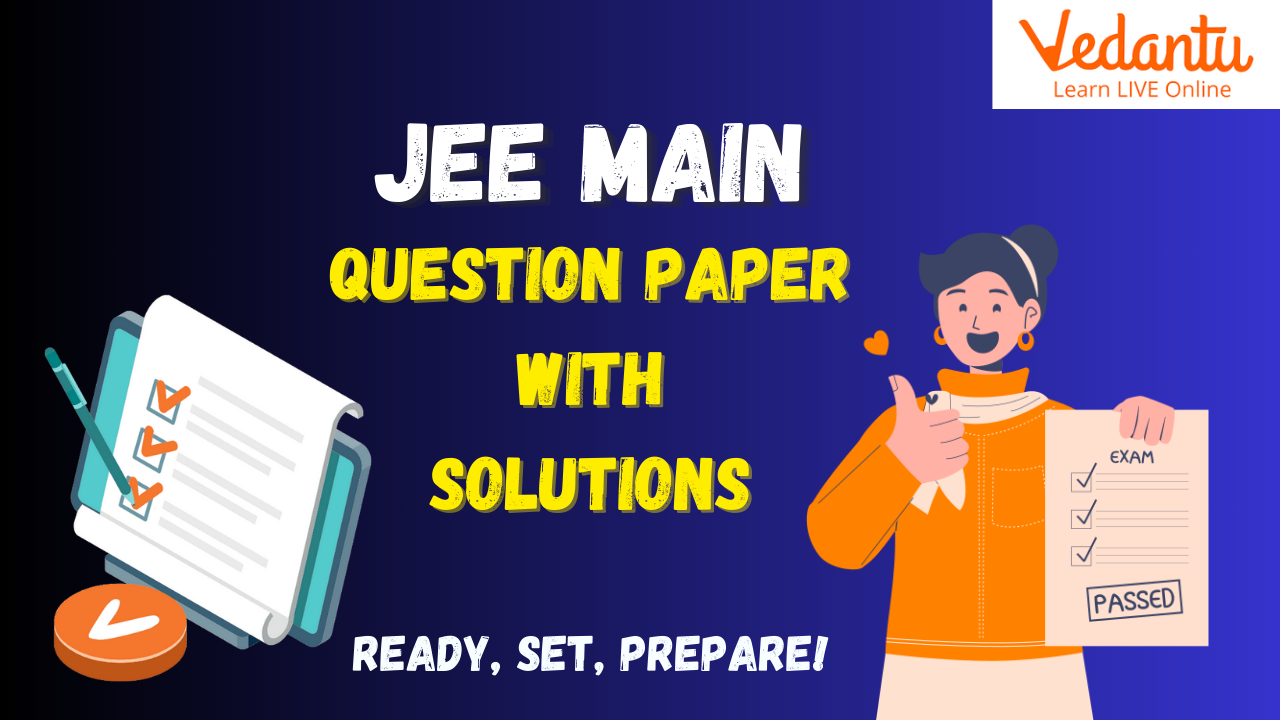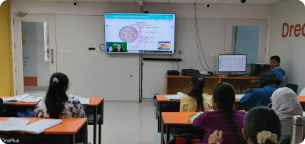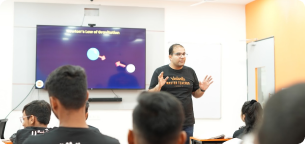JEE Main Previous Year Question Papers with Answer Key and Solution (Free PDF Download)
The Joint Entrance Examination (Main), most commonly known as JEE Main, is one of India's most popular entrance exams conducted by the National Testing Agency (NTA) for Engineering. For candidates who are seeking admission into the top Engineering colleges in India, it is mandatory to clear the JEE Main examination.

In order to clear this exam, JEE Main previous year question papers play a major role. It is also essential to be aware of the updated syllabus of JEE Main 2025 for complete preparation. It is highly advised to all the candidates to practice the JEE previous year's question paper by analysing JEE Main syllabus 2025 to pass this exam with flying colours and wish to secure a higher rank in the JEE Main 2025 exam.
Category: | JEE Main Questions Papers |
Content-Type: | Text, Images, Videos and PDF |
Exam: | JEE Main |
Academic Session: | 2025 |
Medium: | English Medium |
Year | 2014, 2015, 2016, 2017, 2018, 2019, 2020, 2021, 2022, 2023,2024 |
Subjects: | Physics, Chemistry and Maths |
Available Material: | JEE Main Previous Year Question Papers with PDF |
Note: 👉 After taking the JEE Main exam, you can predict your rank using our JEE Main Rank Predictor 2024.
The JEE previous year question paper includes Joint Entrance Exam Questions, JEE Main Mathematics Questions with Solutions, JEE Main Physics Questions with Solutions, and JEE Main Chemistry Questions with Solutions, and each solution has given a detailed explanation in a step-by-step procedure to make it easier and simple for the students. The answer keys are also provided along with JEE Main previous year's papers. JEE Main previous year question papers with solutions PDF are available for free to download.
USE Coupon Code: Click Here for Best JEE Crash Course
JEE Main Question Papers
Tabulated below are the JEE Main Question Papers from 2014 to till date. These Question Papers come along with the Answer key for JEE Main 2024 and Detailed Solutions for each question. We have provided subject-wise papers.
JEE Main Subject-Wise Previous Year Question Papers
Prepare strategically for the JEE Main with access to subject-wise Previous Year Question Papers. Mastering the art of solving past exam papers is key to excelling in JEE Main Exam. Refine your skills and boost your confidence by downloading JEE Main Subject-Wise Previous Year Question Papers.
Explore the table below to download a FREE PDF of Maths, Physics, and Chemistry Question Papers of the JEE Main Exam.
S.No | JEE Main Subject-Wise Question Paper |
1 | |
2 | |
3 |
JEE Main Year-Wise Previous Year Question Papers
Start your journey to JEE Main success by checking out the Year-wise Previous Year Question Papers. These papers help you understand how the exam works, which is super important for getting ready. Practicing with these papers gives you a good idea about how the exam has been changing.
Find the JEE Main Year-Wise Question Papers with solutions from the table below. You can download the PDF of PYQPs of the years 2024, 2023, 2022, 2021, 2020, 2019, 2018, 2017, 2016, 2015, and 2014 for FREE.
S.No | JEE Main Year-Wise Question Paper with Solution |
1 | |
2 | |
3 | |
4 | |
5 | |
6 | |
7 | |
8 | |
9 | |
10 | |
11 |
JEE Main 2024 Question Paper with Answer Key – January 27
JEE Main 2024 Question Paper with Answer Key – January 29
JEE Main 2024 Question Paper with Answer Key – January 30
JEE Main 2024 Question Paper with Answer Key – January 31
JEE Main 2024 Question Paper with Answer Key – February 1
JEE Main 2023 Question Paper PDF Download (January Session)
Access the JEE Main 2023 Question Paper PDF for the January session. Download the comprehensive set of shift-wise JEE Main question papers to enhance your preparation. Get acquainted with the exam pattern, question types, and difficulty levels, refining your skills for a successful exam attempt.
Find the links below for the FREE download of Shift 1 and Shift 2 JEE Main question papers of 24, 25, 29, 30, 31 January 2023.
JEE Main 2023 Question Paper with Solutions – January 24, 2023
JEE Main 2023 Question Paper with Solutions – January 25, 2023
JEE Main 2023 Question Paper with Solutions – January 29, 2023
JEE Main 2023 Question Paper with Solutions – January 30, 2023
JEE Main 2023 Question Paper with Solutions – January 31, 2023
JEE Main 2023 Question Paper PDF Download (April Session)
Access the JEE Main 2023 Question Paper PDF for the April session. Download the comprehensive set of shift-wise JEE Main question papers to enhance your preparation. Get acquainted with the exam pattern, question types, and difficulty levels, refining your skills for a successful exam attempt.
Find the links below for the FREE download of Shift 1 and Shift 2 JEE Main question papers of 6, 8, 10, 11, 12, 13, 15 April 2023.
JEE Main 2023 Question Paper with Solutions – April 6, 2023
JEE Main 2023 Question Paper with Solutions – April 8, 2023
JEE Main 2023 Question Paper with Solutions – April 10, 2023
JEE Main 2023 Question Paper with Solutions – April 11, 2023
JEE Main 2023 Question Paper with Solutions – April 12, 2023
JEE Main 2023 Question Paper with Solutions – April 13, 2023
JEE Main 2023 Question Paper with Solutions – April 15, 2023
JEE Main 2022 Question Paper PDF Download (June Session)
Access the JEE Main 2022 Question Paper PDF for the June session. Download the comprehensive set of shift-wise JEE Main question papers to enhance your preparation. Get acquainted with the exam pattern, question types, and difficulty levels, refining your skills for a successful exam attempt.
Find the links below for the FREE download of Shift 1 and Shift 2 JEE Main question papers of 24, 25, 26, 27, 28, 29, June 2022.
JEE Main 2022 Question Paper with Solutions – June 24, 2022
JEE Main 2022 Question Paper with Solutions – June 25, 2022
JEE Main 2022 Question Paper with Solutions – June 26, 2022
JEE Main 2022 Question Paper with Solutions – June 27, 2022
JEE Main 2022 Question Paper with Solutions – June 28, 2022
JEE Main 2022 Question Paper with Solutions – June 29, 2022
JEE Main 2022 Question Paper PDF Download (July Session)
Access the JEE Main 2022 Question Paper PDF for the July session. Download the comprehensive set of shift-wise JEE Main question papers to enhance your preparation. Get acquainted with the exam pattern, question types, and difficulty levels, refining your skills for a successful exam attempt.
Find the links below for the FREE download of Shift 1 and Shift 2 JEE Main question papers of 25, 26, 27, 28, 29, July 2022.
JEE Main 2022 Question Paper with Solutions – July 25, 2022
JEE Main 2022 Question Paper with Solutions – July 26, 2022
JEE Main 2022 Question Paper with Solutions – July 27, 2022
JEE Main 2022 Question Paper with Solutions – July 28, 2022
JEE Main 2022 Question Paper with Solutions – July 29, 2022
JEE Main 2021 Question Paper PDF Download for All Session
JEE Main 2021 Question Paper PDF Download (February Session)
Access the JEE Main 2021 Question Paper PDF for the February session. Download the comprehensive set of shift-wise JEE Main question papers to enhance your preparation. Get acquainted with the exam pattern, question types, and difficulty levels, refining your skills for a successful exam attempt.
Find the links below for the FREE download of Shift 1 and Shift 2 JEE Main question papers of 24, 25, 26 February 2021.
S.No | JEE Main 2021 Question Paper (February Session) |
1 | |
2 | |
3 | |
4 | |
5 | |
6 |
JEE Main 2021 Question Paper PDF Download (March Session)
Access the JEE Main 2021 Question Paper PDF for the March session. Download the comprehensive set of shift-wise JEE Main question papers to enhance your preparation. Get acquainted with the exam pattern, question types, and difficulty levels, refining your skills for a successful exam attempt.
Find the links below for the FREE download of Shift 1 and Shift 2 JEE Main question papers of 16, 17, 18 March 2021.
S.No | JEE Main 2021 Question Paper (March Session) |
1 | |
2 | |
3 | |
4 | |
5 | |
6 |
JEE Main 2021 Question Paper PDF Download (July Session)
Access the JEE Main 2021 Question Paper PDF for the July session. Download the comprehensive set of shift-wise JEE Main question papers to enhance your preparation. Get acquainted with the exam pattern, question types, and difficulty levels, refining your skills for a successful exam attempt.
Find the links below for the FREE download of Shift 1 and Shift 2 JEE Main question papers of 20, 22, 25, 27 July 2021.
S.No | JEE Main 2021 Question Paper (July Session) |
1 | |
2 | |
3 | |
4 | |
5 | |
6 | |
7 |
JEE Main 2021 Question Paper PDF Download (August Session)
Access the JEE Main 2021 Question Paper PDF for the August session. Download the comprehensive set of shift-wise JEE Main question papers to enhance your preparation. Get acquainted with the exam pattern, question types, and difficulty levels, refining your skills for a successful exam attempt.
Find the links below for the FREE download of Shift 1 and Shift 2 JEE Main question papers of 26, 27, 31 August 2021.
S.No | JEE Main 2021 Question Paper (August Session) |
1 | |
2 | |
3 | |
4 | |
5 | |
6 |
JEE Main 2020 Question Paper with Solutions PDF Download
JEE Main 2020 Question Paper with Solutions PDF Download (January Session)
Access the JEE Main 2020 Question Paper PDF for the January session. Download the comprehensive set of shift-wise JEE Main question papers to enhance your preparation. Get acquainted with the exam pattern, question types, and difficulty levels, refining your skills for a successful exam attempt.
Find the links below for the FREE download of Shift 1 and Shift 2 JEE Main question papers of 7, 8, 9 January 2020.
S.No | JEE Main 2020 Question Paper (January Session) |
1 | |
2 | |
3 | |
4 | |
5 | |
6 |
JEE Main 2020 Question Paper with Solutions PDF Download (September Session)
Access the JEE Main 2020 Question Paper PDF for the September session. Download the comprehensive set of shift-wise JEE Main question papers to enhance your preparation. Get acquainted with the exam pattern, question types, and difficulty levels, refining your skills for a successful exam attempt.
Find the links below for the FREE download of Shift 1 and Shift 2 JEE Main question papers of 2, 3, 4, 5, 6 September 2020.
S.No | JEE Main 2020 Question Paper (September Session) |
1 | |
2 | |
3 | |
4 | |
5 | |
6 | |
7 | |
8 | |
9 | |
10 |
JEE Main 2019 Question Paper with Solutions PDF Download
JEE Main 2019 Question Paper PDF Download ( January Session)
Access the JEE Main 2019 Question Paper PDF for the January session. Download the comprehensive set of shift-wise JEE Main question papers to enhance your preparation. Get acquainted with the exam pattern, question types, and difficulty levels, refining your skills for a successful exam attempt.
Find the links below for the FREE download of Shift 1 and Shift 2 JEE Main question papers of 9, 10, 11, 12 January 2019.
S.No | JEE Main 2019 Question Paper (January Session) |
1 | |
2 | |
3 | |
4 | |
5 | |
6 | |
7 | |
8 |
JEE Main 2019 Question Paper PDF Download ( April Session)
Access the JEE Main 2019 Question Paper PDF for the April session. Download the comprehensive set of shift-wise JEE Main question papers to enhance your preparation. Get acquainted with the exam pattern, question types, and difficulty levels, refining your skills for a successful exam attempt.
Find the links below for the FREE download of Shift 1 and Shift 2 JEE Main question papers of 8, 9, 10, 12 April 2019.
S.No | JEE Main 2019 Question Paper (April Session) |
1 | |
2 | |
3 | |
4 | |
5 | |
6 | |
7 | |
8 |
JEE Main 2018 Question Paper with Solutions PDF Download ( April Session)
Access the JEE Main 2018 Question Paper PDF for the April session. Download the comprehensive set of shift-wise JEE Main question papers to enhance your preparation. Get acquainted with the exam pattern, question types, and difficulty levels, refining your skills for a successful exam attempt.
Find the links below for the FREE download of Shift 1 and Shift 2 JEE Main question papers of 8, 15, 16, 12 April 2018.
JEE Main 2018 Question Paper with Solutions - Online Exam (15th-April Morning)
S.No | JEE Main 2018 Question Paper with Solution (April 15th) |
1 | JEE Main Physics 2018 Question Paper April 15th Shift- 1 |
2 | JEE Main Chemistry 2018 Question Paper April 15th Shift- 1 |
3 | JEE Main Maths 2018 Question Paper April 15th Shift- 1 |
JEE Main 2018 Question Paper with Solutions - Online Exam (16th-April-2018)
S.No | JEE Main 2018 Question Paper with Solution (April 16th) |
1 | JEE Main 2018 Physics Question Paper April 16th Shift- 1 |
2 | JEE Main 2018 Chemistry Question Paper April 16th Shift- 1 |
3 | JEE Main 2018 Maths Question Paper April 16th Shift- 1 |
JEE Main 2018 Question Paper with Solutions (8th-April-2018) Paper-1
JEE Main 2017 Question Paper with Solutions PDF Download ( April Session)
Access the JEE Main 2017 Question Paper PDF for the April session. Download the comprehensive set of shift-wise JEE Main question papers to enhance your preparation. Get acquainted with the exam pattern, question types, and difficulty levels, refining your skills for a successful exam attempt.
Find the links below for the FREE download of Shift 1 and Shift 2 JEE Main question papers of 8, 9 April 2017.
JEE Main 2017 Question Paper with Solutions
S.No | JEE Main 2017 April Question Paper- 1 | JEE Main 2017 Question Paper- 2 |
1 | ||
2 | ||
3 | ||
4 |
JEE Main 2017 April Question Paper with Solutions
S.No | JEE Main 2017 Question Paper (April 8th) | JEE Main 2017 Question Paper (April 9th) |
1 | ||
2 | ||
3 |
JEE Main 2016 Question Paper with Solutions PDF Download ( April Session)
Access the JEE Main 2016 Question Paper PDF for the April session. Download the comprehensive set of shift-wise JEE Main question papers to enhance your preparation. Get acquainted with the exam pattern, question types, and difficulty levels, refining your skills for a successful exam attempt.
Find the links below for the FREE download of Shift 1 and Shift 2 JEE Main question papers of 9, 10 April 2016.
JEE Main 2016 Question Paper with Solutions
S.No | JEE Main 2016 Question Paper with Solution (April 3rd) |
1 | |
2 | |
3 | |
4 |
JEE Main 2016 Subject- Wise Question Paper with Solutions
S.No | JEE Main 2016 Question Paper (April 9th) | JEE Main 2016 Question Paper (April 10th) |
1 | ||
2 | ||
3 |
JEE Main 2015 Question Paper with Solutions PDF Download ( April Session)
Access the JEE Main 2015 Question Paper PDF for the April session. Download the comprehensive set of shift-wise JEE Main question papers to enhance your preparation. Get acquainted with the exam pattern, question types, and difficulty levels, refining your skills for a successful exam attempt.
Find the links below for the FREE download of Shift 1 and Shift 2 JEE Main question papers of 4, 10, 11 April 2015.
JEE Main 2015 Question Paper with Solutions (4th-April-2015)
S.No | JEE Main 2015 Question Paper with Solution (April 4th) |
1 | JEE Main 2015 Question Paper Set-A |
2 | JEE Main 2015 Question Paper Set-B |
3 | JEE Main 2015 Question Paper Set-C |
4 | JEE Main 2015 Question Paper Set-D |
JEE Main 2015 Subject-Wise Question Paper with Solutions
S.No | JEE Main 2015 Question Paper (April 10th) | JEE Main 2015 Question Paper (April 11th) |
1 | JEE Main 2015 Physics Question Paper | JEE Main 2015 Physics Question Paper |
2 | JEE Main 2015 Chemistry Question Paper | JEE Main 2015 Chemistry Question Paper |
3 | JEE Main 2015 Maths Question Paper | JEE Main 2015 Maths Question Paper |
JEE Main 2014 Question Paper with Solutions PDF Download ( April Session)
Access the JEE Main 2014 Question Paper PDF for the April session. Download the comprehensive set of shift-wise JEE Main question papers to enhance your preparation. Get acquainted with the exam pattern, question types, and difficulty levels, refining your skills for a successful exam attempt.
Find the links below for the FREE download of Shift 1 and Shift 2 JEE Main question papers of 6, 9, 11, 12, 19 April 2014.
JEE Main 2014 Question Paper with Solutions (April 6th)
S.No | JEE Main 2014 Question Paper with Solution (April 6th) |
1 | JEE Main 2014 Question Paper Set-E |
2 | JEE Main 2014 Question Paper Set-F |
3 | JEE Main 2014 Question Paper Set-G |
4 | JEE Main 2014 Question Paper Set-H |
JEE Main 2014 Physics Question Paper with Solutions
S.No | JEE Main Physics 2014 April Question Paper with Solution |
1 | JEE Main 2014 Physics Question Paper 9th April Shift- 1 |
2 | JEE Main 2014 Physics Question Paper 11th April Shift- 1 |
3 | JEE Main 2014 Physics Question Paper 12th April Shift- 1 |
4 | JEE Main 2014 Physics Question Paper 19th April Shift- 1 |
JEE Main 2014 Chemistry Question Paper with Solutions
S.No | JEE Main Chemistry 2014 April Question Paper with Solution |
1 | JEE Main 2014 Chemistry Question Paper 9th April Shift- 1 |
2 | JEE Main 2014 Chemistry Question Paper 11th April Shift- 1 |
3 | JEE Main 2014 Chemistry Question Paper 12th April Shift- 1 |
4 | JEE Main 2014 Chemistry Question Paper 19th April Shift- 1 |
JEE Main 2014 Maths Question Paper with Solutions
S.No | JEE Main Maths 2014 April Question Paper with Solution |
1 | JEE Main 2014 Maths Question Paper 9th April Shift- 1 |
2 | JEE Main 2014 Maths Question Paper 11th April Shift- 1 |
3 | JEE Main 2014 Maths Question Paper 12th April Shift- 1 |
4 | JEE Main 2014 Maths Question Paper 19th April Shift- 1 |






Crack JEE Main 2025 with Solved Question Papers
JEE Main is an advanced level entrance exam for engineering in India. It is compulsory for engineering colleges in India to enrol admissions on the basis of the JEE Main 2025 score. This basically means that engineering institutes in India are supposed to give admissions on the basis of the marks and the rank secured by the aspirants in the entrance examination.
JEE Main contains Physics, Chemistry and Mathematics sections. The JEE Main question papers with answer keys for the academic years 2014, 2015, 2016, 2017, 2018, 2019, 2020, 2021,2022,2023 and 2024 are provided in the PDF format by Vedantu available for download both on its website and mobile application. The questions and their answers with keys are also provided in a separate PDF document. These provide all the solutions of the paper in a stepwise manner and they are available in English and in the Hindi language. The PDFs are also available for download for absolutely free. However, kindly note that it may take some time to download the PDFs due to traffic.
As you plan for the JEE Main 2025, it is essential to be aware of the updated syllabus. Make sure to align your preparation with the JEE Main syllabus 2025, to cover all the relevant topics thoroughly and maximize your chances of success in this highly competitive exam.
JEE Main 2024 Exam Dates
The official dates for JEE Main 2024 is released by NTA. You can find the dates for JEE Main 2024 in the table below. The JEE Main 2024 exam dates have to be noted carefully.
JEE Main 2024 Exam Dates: Session 1
Sl. No. | Events | Exam Dates |
1 | JEE Main 2024 Notification Release | September 19, 2023 |
2 | JEE Main 2024 Application Form Release | November 1, 2023 |
3 | Last date of Application submission | November 30, 2023 (till 9:00 pm) |
4 | JEE Main application correction | December 2023 |
5 | JEE Main Admit Card Release Date | Three days before the exam. |
6 | JEE Main 2024 Exam Date | Between January 24 and February 1, 2024 |
7 | JEE Main 2024 Result Date | February 12, 2024 |
JEE Main 2023 Exam Dates: Session 2
Sl. No. | Events | Exam Dates |
1 | JEE Main 2023 Notification Release | September 19, 2023 |
2 | JEE Main 2023 Application Form Release | February 2, 2024 |
3 | Last date of Application submission | March 2, 2024 (till 9:00 pm) |
4 | JEE Main application correction | Third week of March 2024 |
5 | JEE Main Admit Card Release Date | Three days before the exam. |
6 | JEE Main 2023 Exam Date | Between April 1 and April 15, 2024 |
7 | JEE Main 2023 Result Date | April 25, 2024 |
Benefits of Solving JEE Main Previous Year Papers
After finishing the complete preparation, students will be wondering on how to proceed further with their JEE Question Paper. Once they start the revision with the syllabus, here the JEE Main Previous Year Question Paper will come into the picture. These JEE Exam Sample Question Papers will give a brief idea about the nature of the questions that will be asked in the upcoming exams. It also gives a feel of the original exam paper and makes you habituated to the exam atmosphere. Students can understand the JEE Main exam pattern and how the questions are formed and framed in the main examination. It is also a kind of practice to the candidates, which helps in boosting up their speed and maintain the precise level. The major benefit for the students out of this is time-management and even they can know their weak areas on the subject. Regular practice of these papers will help the students staying away from the fear of exam and also boosts them to give the tension-free examination.
Practising previous year question papers will increase the concentration and it will also make you understand how to prioritize in which question to attempt first and which are the questions that need to be attempted in the end.
This builds stamina for the students on how to sit in the exam hall for three hours and focus completely on the exam paper.
Previous year question papers will give an idea about exam pattern and the nature of the questions.
Students also can be aware of the critical level of the questions asked in the exam.
They have to solve these papers in a fixed time, like in a time-bound manner. This improves their level of thinking and answering the questions quickly in the given set of time.
They can check what are the weaker areas and which are the concepts which need more concentration.
By practising them on a regular basis, students can overcome the fear of exams. It also aids them in the pressure of taking a real exam.
Preparation Tips for JEE Main 2025
Clearing JEE Main needs a lot of dedication from the students’ side. They will require to have a well-structured plan to study. The exam will be conducted in the month of May every year. Students have to be strong academically along with various other skills like time management, exam-taking strategy, situational intelligence and analytical skills. Students have to prepare for this exam well-in advanced.
Time-management.
Focus on Important topics.
Plan your day ahead.
The practice is the key to success.
Take tests after every concept.
Regular revision.
Top Ways to be Positive Before the JEE Main Exam 2025
Self-Motivation
JEE Solved Papers make the students to build-up a shield to the brain which makes them work faster than regular. Students get stuck in the middle while solving these papers, in this situation, the solved papers will make them understand the concept and solve the problem. In this way, they don’t feel demotivated.
Certain times, students give up because they are not able to understand one particular concept. At that point, they have to remind themselves that all of them who are preparing for JEE are going through the same situation. Do not quit at this point, they have to understand where the problem is and then focus on rectifying it and then moving forward.
Learn From Your Mistakes
Humans tend to make mistakes and from each mistake, there will be a lot to learn. Stop regretting for what has happened and try to accept it and keep moving ahead. Ignoring mistakes doesn’t help in any mean, keep in mind that, do not fall into the same mistake again. Pick up, dust up and continue with the flow.
Image a Better and Bigger Picture
Never put yourself down, especially when you are preparing for the competitive exams like JEE Main 2025. There comes a moment that you get irritated by looking at the vast syllabus and topics which are difficult. This is the moment where you should start thinking bigger picture of yourself in your mind. If you get selected in one of your dream institutes like IIT or NIT, consider yourself in a position after a couple of years where you get into a good MNC with a hefty package and make your parents proud of what you are.
Set Goals and Reward Yourself
Set a daily goal, there might be few topics which you could finish faster and move with the new ones or maybe you could take more time on fewer topics and which gets postpone to the next day. When you finish your goal for the day, reward yourself for what you have achieved. This brings a huge difference and puts you on a positive note. By doing this you are kind of pushing yourself into a positive zone and making up your mind of the hard tasks which are yet to come on your way. A reward could be ice cream or refreshing yourself with the latest video game which brings you joy. In case, if you have not reached your daily goal, that is totally fine. Do not be on a negative thought, reward yourself for how much you have achieved. Start your day with a fresh mind, and your ultimate goal should be achieving good marks in the final exams.
Positive Self-Assertion
Always think positively, and make sure you’re not getting any negative thoughts into the mind. Staying positive increase the goos spirits and pushes you towards the goal. This increases your will power to achieve your goals and motivates you through the tough times.
Find you’re weaker areas and work over it. You will be the best person to know about yourself. Once you understand your weaker area, things become easier for you to deal with. Be prepared for what you will be facing in the exam and move towards it with positive hope.
Self-Analysis:
By solving these papers, you can analyze your own preparation for the JEE Main exam. You make mistakes and you tend to learn from it but, make sure you are not repeating the same mistake again. Self-analysis helps in knowing your strengths and weaknesses.
Mock Tests with Vedantu
Students can start taking JEE Main mock tests series from Vedantu which covers the entire syllabus of JEE Main 2025. These Mock tests are designed subject wise with the detailed explanation of the questions. They are updated as per the latest syllabus and guidelines provided by NTA. Each paper consists of 90 questions in total with a time limit of 3 hours. After the mock tests, students get to analysis the result as well.
👉Put your knowledge to the test with our challenging JEE Main mock tests series, ensuring you're well-prepared for the real deal.
JEE Main Sample Paper with Vedantu
Certainly! Students can start practicing JEE Main sample papers with Vedantu, encompassing the entire syllabus of JEE Main 2025. These sample papers are thoughtfully designed subject-wise, providing detailed explanations for each question. They are regularly updated in accordance with the latest syllabus and guidelines from NTA. After completing the sample papers, students can analyze their results to identify areas for improvement and assess their preparedness for the actual exam.
👉Take the first step towards success – click here to explore our JEE Main sample papers now!
Achieve the Highest Score in Your JEE Main Exams with Our Chapter-wise Practice Papers
Looking for practice papers to score high in JEE Main exams? Download our comprehensive collection of JEE Main practice papers designed to boost your preparation. With targeted questions and in-depth solutions, these papers are an invaluable resource to enhance your performance and secure a top score. Start practicing now and excel in your JEE Main exams!
Crash Course with Vedantu
We at Vedantu provide JEE Crash Course targeting JEE Main. It includes:
JEE classes by IITans
CBSE board session with LIVE quiz
Test series which consists of more than 5000+ questions, which are designed by our experts
JEE Tips/Tricks LIVE session by IITans
Doubt solving by experts
Recordings of LIVE classes.
Students who work hard to crack JEE Main should try to solve all the questions in the JEE Main previous year question papers within the set time limit. This practice of Time Management is recommended for the D-day so that he/she can evaluate his/her strengths and weaknesses in the subject. You should try to solve the previous year JEE Main question paper on your own in the original exam duration which will boost take your confidence to another level and will help to score good marks in JEE Main Exam. This real-time exam feeling also helps to get habituated to solve the question in fixed time frames.
A vital element of preparation for the JEE Main 2025 exam is to understand the solution of the questions which you are not able to solve by yourself and have to refer to the solution. This is where you can make full use of JEE main question paper with solution PDF and grasp all the important details. Understanding these solutions is critical so that you don’t end up making the same mistake on the day of examination. The JEE main previous year question paper with solution PDF download will help you assess your preparedness by highlighting their strengths and weaknesses.
This enables you to focus on areas on which need more attention. Vedantu’s JEE main previous year question paper with solution PDF is a powerful tool that can help the students to get familiarised with the question paper pattern and the marking scheme beforehand. Another benefit of Solving JEE Main previous year question paper is it will help you to identify questions that are often repeated and twisted in various ways in the examination. Identifying these questions properly will give you an extra edge in scoring well in JEE Main Examination.
Why Choose Vedantu to Prepare for the JEE Main Examinations?
Vedantu frequently updates its website as per the latest guidelines related to JEE examinations that are rolled out from time to time. Just bookmark the page and visit it at regular intervals in a month. All the important points mentioned on the website will help you to crack JEE Main exams. All the questions and answers of this exam will help you to prepare for the future.
JEE Main is conducted two times a year - based on the academic year - session 1 in January and session 2 in April every year.
At Vedantu, we provide the JEE Main previous year question paper along with the answers keys. This will help students to understand the questions which were asked in previous years of JEE Main examinations. They can use the JEE Main answers to prepare for the exam for the current academic year.
Furthermore, the links on the website are provided to download the JEE Main question paper of different years. The question paper along with answer keys will help students to prepare for the JEE Main test. Links to all the previous year question papers are available in a chronological order on the website of Vedantu, all you need to do is click on the links and download the question papers in the PDF format.
Candidates who are preparing for JEE Main can take advantage of the previous year JEE Main question papers and answer keys that are offered by Vedantu. The paper provides an opportunity to the students to assess their understanding of the concepts and topics from the various previous years and their respective answer keys.
The answers are provided in the answer key format. So, candidates who need to check their answers for various previous year JEE Main papers can download the answer key solutions. As there are two sets of papers, they can download both the answer keys. Further, students can access the latest JEE Main question paper available on Vedantu. The paper is available in PDF format. The questions and answers in the sample question papers are prepared based on the previous year questions that were asked in the JEE Main exams. Download the PDF file of JEE Main paper along with the answers and follow the instructions provided in the PDF file to understand the questions. The paper also contains the questions along with their description, question number, and their answers.
Conclusion
The JEE Main Previous Year Question Paper PDF from Vedantu serve as invaluable tools for aspirants preparing for this competitive exam. Offering a comprehensive glimpse into the exam pattern, question types, and difficulty level, these papers aid in refining strategies, improving time management, and enhancing problem-solving skills. They act as a compass, guiding students through the intricacies of the JEE Main examination, fostering confidence and familiarity with the format. Vedantu's repository of past papers equips candidates with the necessary edge, empowering them to approach the exam with poise and competence, ultimately contributing significantly to their success in this pivotal academic pursuit.






FAQs on JEE Main Previous Year Question Paper with Answer Keys and Solutions
1. How to Develop Better Skills for Solving JEE Questions?
Practise makes a man perfect and the same applies to JEE exams as well. Unlike the regular board exams, JEE is a competitive exam. It tests more than your conceptual understanding of the syllabus. It tests your knowledge, accuracy and decision making skills. Therefore the strategy to study the same will also differ. You must make sure that you practise as many previous years question papers and take up as many mock papers as possible. The syllabus is already being studied for board exams, therefore students must practise analyzing and arriving at the right answers in the shortest period of time. This can be done through repeated practise of previous year question papers.
2. What is the General Paper Pattern of the JEE Main 2025 Exam?
The following is the general paper pattern of JEE Main 2025 exams.
Exam Mode - Computer-based test mode.
Exam Duration - 3 hours (4 hours for persons with benchmark disabilities).
Subjects - Physics, Chemistry, and Mathematics.
Total Number of Questions - 75 (Each subject will have 25 questions).
Type of Questions - 20 MCQ, 5 Numerical questions (numerical value as an answer).
Marking Scheme - For MCQs - +4 Marks for a correct answer and -1 Mark for an incorrect answer, For answer with numeric value - +4 Marks for every correct answer and 0 Mark for every incorrect answer.
Maximum Marks - 300.
Medium of Exam - English or Hindi (Candidates from Gujarat, Daman & Diu and Dadra and Nagar Haveli can opt for Gujarati as well).
3. What are the Benefits of Solving Previous Year Question Paper?
The benefits of solving Previous years Question Papers are as follows:
Helps you to analyze your preparation levels.
Will learn time management.
Helps students to improve the accuracy of their answers
Aid students to identify their strengths and weaknesses.
Helps you to identify important chapters, concepts and their weightage.
Gives you a clear picture of the exam paper pattern.
Allows you to identify repeated concepts and questions patterns allowing you to plan your study strategy accordingly.
4. How Does Vedantu Help Students Perform Better in JEE Main 2025?
Vedantu is the leading Ed-tech platform in India. The core objective of Vedantu is to provide quality education for students and develop in them a sense of motivation and drive towards gaining knowledge. Also, it promotes and upholds the concept of studying from the comfort of your home for better performance. Therefore students can avail LIVE online, two-way interactive classes from experts to help them clear their JEE Main 2025 exam. Students are also provided with doubts solving sessions to help students understand concepts better. Along with these, students can get solved previous years question papers, mock papers and mock tests for JEE Main 2025 paper to help students boost their performance.
5. Is it compulsory to attempt the JEE Main 2025 entrance examination to join IIT?
Yes, to all those who aspire to get into the top engineering colleges with world class infrastructure namely IITs and NITs, you can only get through by giving this entrance test. Though few institutions have their specific entrance examinations like BITSAT, it is preferred to prepare for JEE Main 2025 which is considered one of the toughest exams in the whole world. In order to get yourself closer to your dream IIT, Vedantu provides study material, revision notes and many more.
You can avail all the well-researched and good quality chapters, JEE Main sample papers, syllabus on various topics from the website of Vedantu and its mobile application available on the play store.
6. What is the weightage of each section in JEE Main 2025?
The pattern of JEE Main 2025 remains the same every year. It is important to note that students have to opt for either or both of the 2 papers conducted where Paper-1 is for engineering which has both online and offline whereas Paper-2 is for the students who are interested in architecture which is only a pen and paper test. Paper-1 consists of 75 questions and the maximum mark is 360. It is divided into three sections - Physics, Chemistry and Mathematics having 25 questions each and a total of 3 hours of time.
7. How to score well in the JEE Main examination 2025?
Solving the previous year question papers help a student understand the pattern of the question paper and analyse them in a logical way. Anyway, JEE doesn’t repeat the questions in phases as it is but they may likely change the values keeping the concept the same. This would help students understand the important topics to be covered. Vedantu aims to be a helping hand to students thereby making way to their desired institutions with detailed notes, mock test papers, Syllabus for JEE Main, previous year papers with expert teacher answers and live doubts sessions. Visit the app or website of Vedantu to know more.
8. Why is the JEE Main paper considered the toughest to crack?
The JEE Main is one of the toughest exams in the entire world, which is because of the extremely limited number of seats available and the overwhelming number of students appearing for the exam. Also, it has a vast syllabus divided into three subjects. Another aspect why it is titled a tough exam is because of its high cut-off rates which have been increasing due to huge competition. The JEE paper is really unpredictable, so it is advised to be prepared from every corner and definitely solving the previous year question papers gives a better idea about the entrance test.

